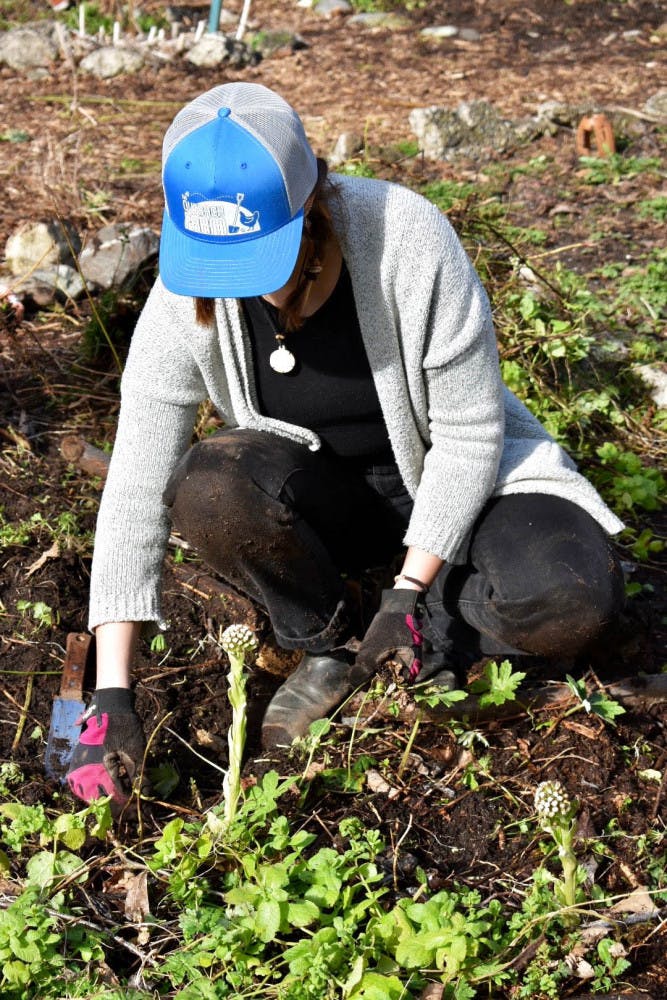
Column by Emma Bjornsrud
As sidewalks have been poured, roads paved and foundations laid, the relationship between humans and the environment has lost its value to many.
It’s only natural for our connection with the planet to shift and evolve as new technology is created and our priorities change. But are we living lives too fast-paced to notice the nature around us?
Cindy Frantz, a professor of psychology and environmental studies at Oberlin College and Conservatory, said the combination of her specializations allows her to think about how to change the human behavior that leads to environmental problems.
Actions as simple as being outside may have a significant impact.
“In our research, we've shown that even just a 15-minute walk in the woods can help increase our connection to nature, decrease stress and decrease cognitive fatigue,” Frantz said.
Although time spent outside may add to our appreciation of nature, true environmentalism requires active effort, such as contacting legislators and advocating for environmental justice.
Nick Engelfried is the founder of Reconnect Earth, an organization that aims to educate and empower leaders tackling social and ecological justice topics.
To strengthen our relationships with the environment, Engelfried advised taking time to notice the natural world around us.
“You don't have to go out to a remote wilderness area to do that,” he said. “You can notice the changes in nature in Bellingham — different flowers coming out, different birds starting to arrive in spring. That's something that you can do almost anywhere to start to cultivate that relationship.”
Sage Fairman, the Associated Students Outback Farm’s operations coordinator, said her connection to nature grew when she moved to Washington for college and learned about the species and uses of different plants.
On the farm, it’s easy to see how much effort goes into sustainable practices such as organic farming and permaculture that create a natural, healthy ecosystem.
“We attempt to maintain biodiversity in the area and really utilize the resources that we have here, keeping it a closed-loop system where what grows here stays on the land, and the seeds that we harvest are planted back in the soil,” Fairman said.
Think of sustainable farming as a form of budgeting — the goal is to support and preserve the environment far into the future. We have a responsibility to be thoughtful and intentional about the impact we have on the land.

Edward Johnson, The Outback’s permaculture coordinator, said anyone can implement sustainable farming to suit their needs, benefitting both the farmer and the environment.
“In permaculture, the big idea is working with nature, not against it, mimicking natural patterns and processes,” he said. “Scaling up isn’t really always an option, but instead, designing easily replicable modular systems that can be implemented, with variation depending on the context, is [an option].”
In the face of climate change, it’s more important now than ever to pour time and effort into our relationship with the planet.
Frantz said conversations around climate change can be difficult because there’s a fine line between the effects of positive and negative rhetoric. Frantz was part of a study published in the article, “The Earth is our Home: Systemic Metaphors to Redefine our Relationship with Nature,” that looked at the effectiveness of different phrases about the planet on different types of people.
“On the one hand, we need to convey that this is an emergency, and we have to act really quickly,” she said. “On the other hand, if we scare people too much, they just shut down. We really need to systematically share the positive things. We need to go out of our way to look for them, and then we need to go out of our way to trumpet them.”
Climate change is an intersectional issue, but we don’t often talk about its effect on marginalized groups. Engelfried said inclusivity is very important to environmentalism.
“I wish I had made the connections earlier between environmental issues and social justice issues,” he said. “Through doing environmental work with folks who were also very involved in social justice concerns, I started to see more of the social justice implications of environmental issues.”
Engelfried said mainstream environmentalism and environmental education are grounded in a Western tradition of ecological observation.
“It's important to realize that every culture has its own traditions of interacting with the natural world and observing the natural world,” he said. “So, being more inclusive in those different ways of connecting with the environment is a really important part of making environmentalism more inclusive.”
It’s human nature to want to feel like we’re part of something bigger than ourselves, Frantz said. The fight against climate change will require us all to work together.
“Making it clear that any little thing that you're doing is part of this vast effort that involves so many people is another way of making people feel empowered,” she said. “If you feel like it's just you and your puny little action is worthless, I mean, one action is worthless. But many, many small actions by lots of people add up to something important.”
Environmental issues affect us all. The tie between humans and planet Earth is probably the most significant example of interdependence (in our solar system, at least). Our planet needs us, and we need it, too.





